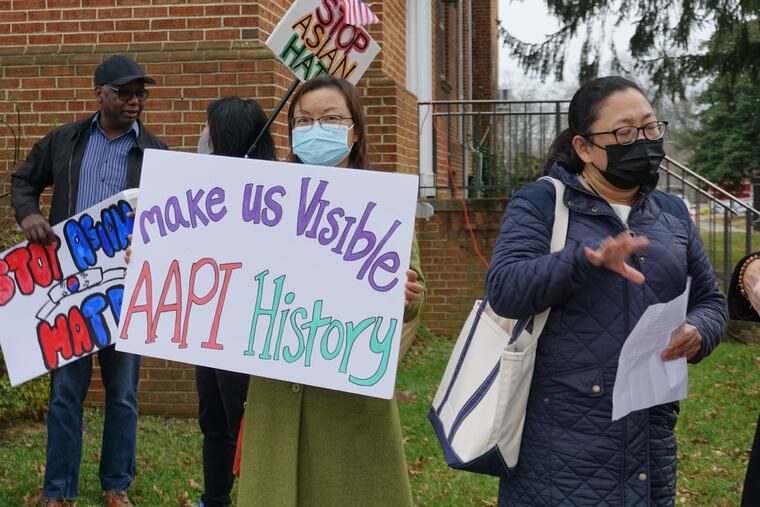Asian American and Pacific Islander history could be mandatory in N.J. school curriculum
New Jersey could become the second state to pass a law mandating that public schools teach Asian American and Pacific Islander history in schools.

New Jersey public schools could be required to infuse the history of Asian American and Pacific Islanders into their curriculum beginning with the 2022-23 school year.
A bill that would make it mandatory for inclusion in K-12 curriculum statewide cleared both houses in the State Legislature this month and awaits action by Gov. Phil Murphy. New Jersey would become the second state to require it (Illinois is the first), and similar bills are being considered in eight other states.
”They’ve contributed to our great culture in America,” said state Assemblyman Gordon Johnson (D., Bergen), one of the bill’s sponsors. “It’s important that we recognize that and we teach that to our children.”
Advocates fast-tracked the measure in response to a spike in hate crimes against Asian Americans and Pacific Islanders since the beginning of the pandemic. In March, six women of Asian descent were killed at spas in Atlanta.
“We feel that education is the best antidote to hate,” said Kani Ilangovan, of West Windsor, founder of Make Us Visible NJ, a coalition of parents, students and educators who pushed for the bill. “It is very important for all of our lives and histories to be valued.”
According to a national report by Stop AAPI Hate, one in three Asian American or Pacific Islander parents said their child experienced a hate episode at school from March 2020 to August 2021.
In New Jersey, bias acts against Asian Americans increased by 82% from 2019 to 2020, according to Ilangovan. Asian Americans make up more than 10% of the state’s nine million residents.
A child psychiatrist, Ilangovan, who is Indian, said many parents were afraid to send their children to school after reopening. Some children were bullied and taunted with chants of “China virus and Kung flu,” she said.
“We have to help our kids not be so ignorant,” she said in an interview this week.
During a recent hearing before the Legislature on the bill, students and advocates shared poignant stories about their experiences with anti-Asian racism. Christina Huang, 17, a student at Ridgewood High School in North Jersey, recalled classmates laughing at her grandmother who was outside practicing zaocao, a Chinese exercise routine, when their school bus pulled up in front of her home.
“I will never forget walking off the bus past my classmates as they stretched their eyes at me and mocked my grandmother’s movements. At that moment, I felt so alone and humiliated. I was only 7 years old,” she testified.
» READ MORE: This Black History Month, help us be the generation that ends systemic racism | Opinion
Samantha Lee, 15, a sophomore at Eastern Regional High School in Voorhees, who is Korean, said she believes the bill, if adopted, would help combat the racism and stares she has experienced in her Camden County district.
Lee joined others students, parents, and political and faith leaders at a rally in Cherry Hill earlier this month to support the bill. She gave a passionate speech about how schools would benefit from its passage.
”I want people to know that Asians weren’t just this sidekick to European history and that they have their own major role in shaping the world today,” Lee said. “It’s especially important that everyone of all races learn about each other.”
Cherry Hill Mayor Susan Shin Angulo, who in 2020 became the first Korean American elected to serve in that role, hopes students will be encouraged by her political accomplishments. She was also the first Korean American county commissioner.
“This is a huge step for Asian American students,” said Angulo, 51, who testified in support of the bill. “We must show them that they can thrive in any profession or field.”
If the bill becomes law, as many expect, students could learn about people such as Wong Kim Ark, the American-born son of Chinese immigrants whose landmark case established birthplace citizenship. Or Patsy Mink, a third-generation Japanese American from Hawaii, the first female of color elected to Congress, in 1964. Or Larry Itliong, a Filipino American labor leader who helped change working conditions for farm workers.
Johnson expects Murphy to sign the bill into law before the current legislative session ends Jan. 10. Murphy’s office does not comment on pending legislation.
Some districts, such as the Hopewell Valley Regional in Pennington, have already implemented AAPI curriculum in all grade levels, according to the New Jersey School Boards Association. About 12% of its students are Asian American/Pacific Islander.
A statewide curriculum would be developed by a Commission on Asian American Heritage in the state Department of Education. It then would be up to local school boards to implement the state mandate, including how to teach the curriculum and what books students should read.
» READ MORE: Cherry Hill School District becomes first in N.J. to mandate African American history course for graduation
New Jersey previously adopted laws requiring public schools to incorporate African American history into K-12 social studies lessons, teach about the Holocaust and genocide, and include instruction about the contributions of lesbian, gay, bisexual, and transgender people.